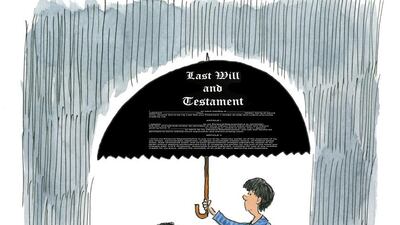I feel like my life is a black comedy at the moment.
I'm sporting a fractured elbow – yes, my right – courtesy of breaking a fall out of a tree (don't ask). My older son is on the receiving end of a few medical issues. My former husband broke his leg falling off a motorbike. The only sane, safe one among us appears to be six-year-old Bereket. But it's early days – he only joined the family two months ago, and is on a steep learning curve in the ways of how to live à la Abu Wardeh.
Besides having to piece together how we tackle the daily and the mundane – like how to get to school and work when you can't drive and have restricted movement – my injury has given me the impetus to finalise a will that takes into account my new family make-up.
Just as there is no one way to live or earn, the definition of family and where you draw your lines of responsibility lie firmly with you. There are social norms, but not every family is typical and divorce stats scream that patchwork clans are on the rise.
Like the family we met when sharing a chalet one holiday. The husband and wife have four children between them. Two are hers and two his. A couple of times a year they all holiday together. During the rest of the time the two younger ones (his) live with their mother, while the two older ones (hers) have flown the coop – one works, the other is still at university. I remember thinking how wonderfully they all fit so nicely into each other's lives, and how much fun they have together. But, I wonder how chummy everyone would be if a parent died intestate, not having made a will – especially when you realise that the younger children's mother is struggling to make ends meet, and the older children's mother has an array of properties spread across the United Kingdom and lives in a house with a sizeable garden in London's Notting Hill – an extremely pricey pad, to be sure.
If so, they would be one of the estimated third of adults in the UK who die without a will. Two-thirds of adults there do not have one.
People in the United States do not fare any better. A recent study finds that 62 per cent of participants aged 45 to 54 do not have a will. This goes up to 67 per cent for women in that age group.
This can, and does, lead to heartache. I'm sure I don't need to explain why. Personally, I like the idea of gathering loved ones and asking them to figure out what they'd like when you die. I know people who've done this: there's discussion, possessions are allocated, everyone knows and hopefully is happy.
This sort of thing does not happen when we're busy in the building phase of life, with young children to look after. But it's exactly during this messy, tiring phase that issues must be nailed down. Living here in the UAE makes it even more vital, because if you don't, and you die, not only do you have no say over how your possessions are distributed, it might be some time before they are, with assets and accounts frozen in the interim – I'm sure you've heard the stories of no money to pay school fees, or for food for that matter, because of no will or estate planning. Can you imagine young children losing a parent, or both, and not knowing who is going to look after them? Worse still, being taken in by well-meaning authorities while decisions are made?
Many families don't conform to a fairytale standard. Mine doesn't. Figuring out how to fit its pieces together was brought home when mulling over what my younger adopted son could call my former husband and the father of my older boy. Or what he could call his brother's newly born paternal cousin. Think about that.
But it's about more than labels and names when it comes to estate planning. Whether you're part of a nuclear family or a modern blended one, deciding who gets what and how is important, even if you don't really mind who ends up with your stamp collection or can't imagine a fight over the plates you inherited from your aunt. Someone in your tribe might.
Distributing money, investments and income is a different thing altogether. And while you have dependents, you need to get on and figure out all the detail, including how school fees will be paid, who has guardianship and how your children will access money they inherit and when.
A friend of mine came up with a list of final wishes titled "Get Your [Stuff] Together". Hers is not as complex as mine, unless you give equal weighting to children and pets. I have the children (and pet), she has the pets. But it is still a very consuming affair.
And so, to cut out any chance of a black comedy upon death, get your stuff together.
Nima Abu Wardeh is the founder of the personal finance website cashy.me. You can reach her at nima@cashy.me and find her on Twitter at @nimaabuwardeh.
pf@thenational.ae
Follow us on Twitter @TheNationalPF

Leave a will so there’s a way to resolve issues
Nima Abu Wardeh's 'black comedy' life has encouraged her to draw up a new will to ensure all family members are taken care of.
Most popular today
